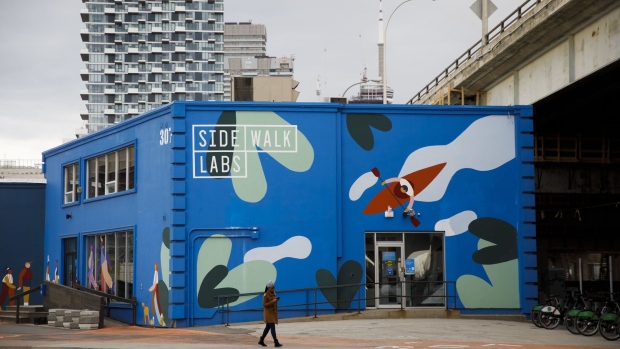Feb 2, 2022
Alphabet’s Sidewalk Labs Offshoot Is Now a Unicorn
, Bloomberg News

(Bloomberg) -- After Alphabet Inc. shelved plans to build its own city and wound down the company in charge of the project, a group of former employees is carrying on its legacy. Their startup, Sidewalk Infrastructure Partners LLC, is pursuing ambitious infrastructure projects, including the construction of specialized roads for self-driving cars, a sprawling smart grid project and the implementation of technology to help cities build 5G wireless networks.
On Wednesday, the company plans to announce it raised $400 million from StepStone Group Inc., an investment firm that focuses on infrastructure. The deal values the business, known as SIP, at $1.25 billion, said a person familiar with the terms who asked not to be identified because they’re private.
The idea for SIP came from Sidewalk Labs, the smart-city company that Google created in 2015. Sidewalk’s flagship project was Quayside, a plan to develop a 12-acre site in Toronto to showcase various high-tech urban ideas. Building a city from scratch made sense as a way for Google’s parent company to experiment with urban innovation, said Jonathan Winer, SIP’s co-founder and co-chief executive officer. However, “There were a number of infrastructure systems that needed innovation now, not in 10 years,” he said.
In 2019, he and several other Sidewalk employees left to form SIP with a plan to build large, technically sophisticated projects. Alphabet and the Ontario Teachers Pension Plan funded the effort as its only investors. (Neither participated in the latest round.)
Sidewalk Labs said in 2020 it was no longer pursuing Quayside. This past December, Daniel Doctoroff, Sidewalk Lab’s CEO and the former CEO of Bloomberg LP, the parent company of Bloomberg News, stepped down for health reasons. Google said it was absorbing the company’s existing projects.
SIP is set up in an unusual way for a startup, operating sometimes as a sort of venture capital firm and other times as an operator building projects itself. This allows it to pursue a wider range of projects, Winer said.
Among them is a 40-mile highway between Detroit and Ann Arbor, Michigan, designed for autonomous and connected vehicles. Michigan’s state government unveiled the plan in 2020, and Winer said the first stretch of road will open this year. He’s in talks with other states about similar developments, he said. SIP has also invested $100 million a project in California that uses smart thermostats and plugs to compensate customers for reducing their energy use at times of high demand.
Much of SIP’s business involves working with governments. SIP expects the Biden administration’s infrastructure law will provide new business opportunities, Winer said. One possible benefit would be to SIP’s budding 5G business. Late last year, SIP bought Dense Air, a startup that makes 5G technology for European cities. SIP plans to begin offering Dense Air’s services in the U.S. in the first half of the year.
In addition to being an investor, Alphabet is an active participant in several SIP projects. Waymo, Alphabet’s self-driving car unit, is on the advisory board of the Michigan highway project. Google’s Nest thermostats work with the California program. “We benefit tremendously from Alphabet’s technology and insight,” said Winer. “And sometimes that insight translates into some kind of business transaction.”
©2022 Bloomberg L.P.





